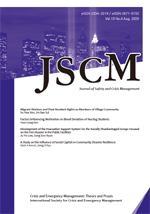Migrant Workers and Their Resident Rights as Members of Village Community
- 위기관리 이론과 실천
- JSCM(Journal of Safety and Crisis Management)
- Vol.10 No.4
-
2020.081 - 14 (14 pages)
-
DOI : 10.14251/jscm.2020.4.1
- 22

This study analyzes the life experiences of migrant workers as members of village community from the perspective of resident rights. Of the various migrant groups, migrant workers are one of the most vulnerable. Thus, strengthening this group’s access to c itizenship i s an important i ssue i n K orean society. Under t he c urrent s ystem, m igrant w orkers a re a llowed legal entry into ROK with an E9 visa. Many of these individuals work toward gaining E7 visa status, which allows them to invite their family members to legally stay with them, thus expanding their rights of residence. However, migrant workers whose visas have expired or who have entered ROK on a tourist visa are not eligible for the rights. Furthermore, there are various levels of accessibility among migrant workers depending on their resident status, further separating within the minority group, resulting in a polarized spectrum with denizens and margizens at either end. In addition, social perceptions toward migrant workers weaken their sense of identity as residents even more, hindering their roles within local communities. So, there is a clear need for social agreement in improving existing systems for migrant workers, and social efforts must be made to ensure that migrant workers feel a sense of identity as residents and belonging within their village community.
Introduction
Relevant Literature
Research Method and Characteristics of Research Subject
Status of Sojourn: Swamp of System
Factors Hindering Resident Consciousness
Conclusion
Acknowledgement
References
(0)
(0)